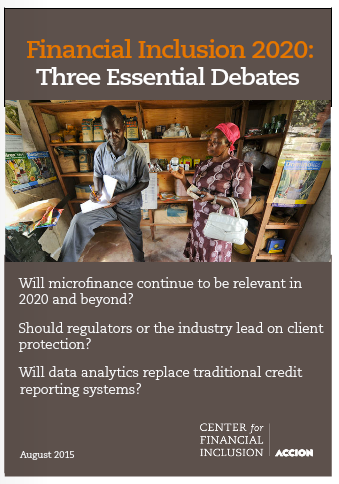
Published: August 2015
Will microfinance continue to be relevant in 2020 and beyond? Should regulators or the industry lead on client protection? Will data analytics replace traditional credit reporting systems? A new Financial inclusion 2020 e-magazine explores these three essential questions debate-style, tapping industry leaders from around the world to weigh in with their perspectives.
Microfinance as a development strategy has in the past few years been eclipsed by the excitement around financial inclusion. This transition reflects the recognition that people need a full range of financial services. What does the future hold for microfinance institutions and other players like traditional banks and new fintech companies? Bindu Ananth, Chair of IFMR Trust and IFMR Holdings, Dean Karlan, President of Innovations for Poverty Action, and Liza Guzman, Vice President of Accion share their views.The ideal balance in client protection is often conceived as a three-legged stool in which regulators, providers, and consumers work at equal levels of responsibility. Globally, regulators have often taken the lead, but initiatives such as the Smart Campaign prove that there is room for providers to move beyond compliance. Is a balanced three-legged stool realistic? Among the debaters are Alok Prasad, Principal Advisor of RBL Bank, Sinha, Managing Director of M-CRIL, and Isabelle Barres, Director of the Smart Campaign.
In data analytics, using alternative sources of data are generating ways to assess the credit-worthiness of thin-file customers who have been traditionally left behind by standard metrics. Michael Turner, President and CEO of PERC, and the Venture Lab at Accion team contribute their perspectives on whether data analytics will replace traditional credit reporting systems.
Although the e-zine is best viewed online, a PDF download is also available here.



